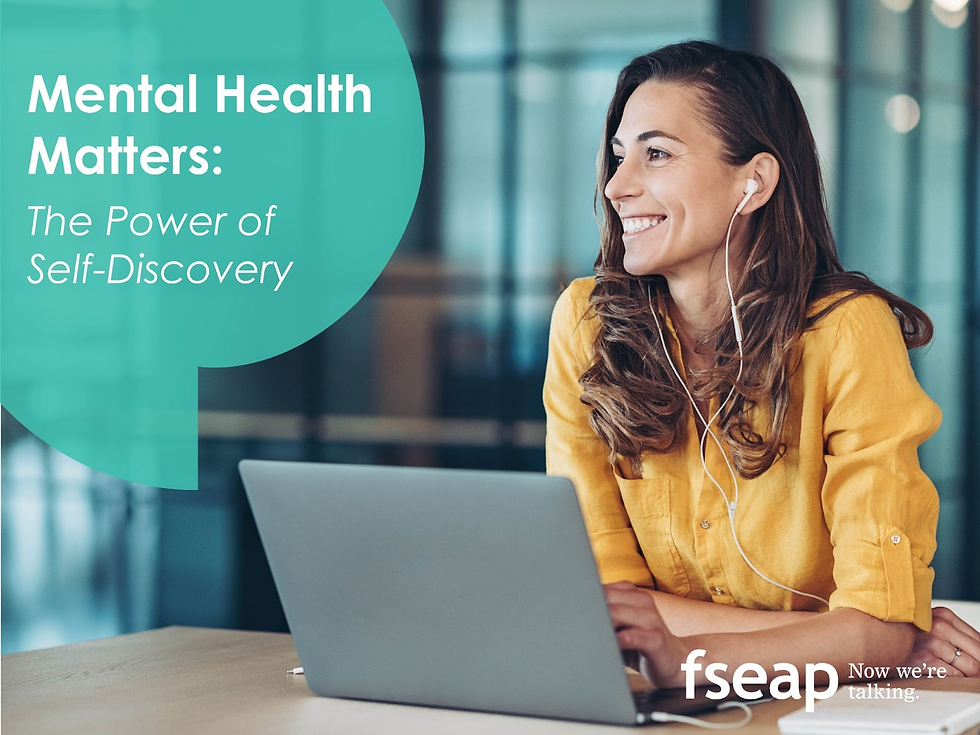The Power of Self-Discovery: How Connecting with Yourself Can Transform Your Mental Health
- FSEAP
- May 2, 2023
- 3 min read
Updated: Oct 12, 2023

Mental health can affect and dictate almost all aspects of our lives. Our experiences in life are filtered through the lens of our mindset, so what we think directly influences our feelings and actions. If we are feeling depressed and anxious, everything in life can be affected by this state of mind.
When your mental health feels sensitive and out of sorts, it may be a sign that you need to confront your feelings and connect deeper with yourself. Having a relationship with ourselves is a very real and crucial part of life - this is our self-esteem, self-worth, self-acceptance, self-concept, and self-evaluation. This is the most important relationship we have, as it sets the tone for all of our other relationships in life.
If we love and accept ourselves, we are more inclined to be forgiving of our mistakes and react less critically to our shortcomings. We see our worth and choose to treat and speak to ourselves with dignity and respect. This can lead to fewer negative thoughts and reactions and a more positive outlook in your life. Therefore, improving our relationship with the self is a crucial part of improving our mental health.
Taking the time to be intentional with how you show up for yourself, whether it is to listen without judgment or take space to experience your feelings, is important to cultivating a positive self-understanding. In this process, you learn to value your strengths and weaknesses while evaluating yourself from a place of compassion.
Here are 5 tips to help you connect with yourself:
Journaling
Journaling is an effective way to observe your thoughts and feelings as the act of writing lets you visually see the commentary in your head. Think of them as colors - the thoughts that run through your mind will alter how you view and approach life. Take notice, are they: Critical? Confused? Loving? Hateful? Kind? Sorrowful? Jealous? Envious?
Ask yourself if you would ever speak to someone else in that tone or with those words. If the answer is no, then perhaps it’s a sign to work on being more compassionate and understanding to yourself.
Meditation
Meditation is a powerful tool that helps us become increasingly self-aware. Thoughts create feelings, and feelings generate action. Practicing meditation helps you become mindful of the influences between your thoughts, emotions, and actions by observing them through a third-person perspective rather than embodying them as your identity.
This self-awareness reminds us that you are not your thoughts and feelings - you are simply the vessel that is experiencing these things. By understanding these patterns, it can help us understand our emotions and motivations and guide us to take aligned action toward our goals. Meditation can also release stress and tension, and better equip us to navigate the challenges of life with greater clarity.
Exercise
Regular exercise can have profound impacts on your self-relationship by fostering greater respect and acceptance. Physical activity is proven to boost mood, reduce stress, and alleviate symptoms of anxiety and depression - all of which can contribute to a positive self-image. Challenging yourself physically will test your own limiting beliefs and lead to a more compassionate self-relationship. Over time, pursuing your fitness goals will strengthen your pride, confidence, and trust in the self.
Hobbies
Hobbies are an important but often neglected part of adult life. Making space to explore your changing interests and engage in meaningful activities can bring you joy and fulfillment. Hobbies are a great way to tap into “flow” - a term used in positive psychology that describes that feeling of energized focus and enjoyment while in the process of an activity. By focusing on the task at hand, it can help reduce stress and anxiety, disconnect you from the distractions of daily life, and create a space for self-discovery and personal growth. Hobbies are also a great way to express yourself - it is something done only for yourself, and not for anybody else.
Personal Development
Like hobbies, exploring self-development helps build and strengthen your personal image by exploring the areas that you wish to improve. Through this process, we develop a greater sense of our strengths and weaknesses, practice patience, and learn to give ourselves grace as we challenge ourselves. This gives you the opportunity to appreciate the journey of becoming your best self. There are many ways to seek self-improvement. Some popular resources include books, podcasts, YouTube, and online courses.
Personal development is important because it gives you a choice to change. The more you are able to identify what you want in life and take intentional, aligned action, the more you grow into your full potential. Cultivating this self-awareness empowers you to build a more confident and capable version of yourself.